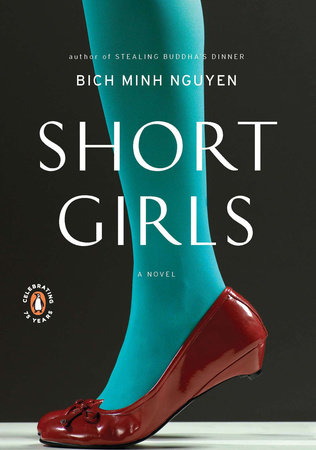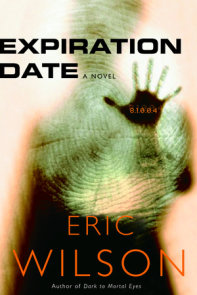READERS GUIDE
Questions and Topics for Discussion
INTRODUCTION
Van and Linny Luong are just a year apart in age, but they are separated by a much greater divide. As the daughters of Vietnamese immigrants who unexpectedly found themselves in the cold and culturally baffling world of suburban western Michigan, each has striven to find her own sense of identity, albeit in very different ways. Serious and studious Van pursued academic success while beautiful Linny rebelled against her sister’s example and sought acceptance amongst the popular crowd. Now, circumstances, and the demands of their eccentric, widowed father, lead them to rediscover one another, their pasts, and what it means to be second-generation Vietnamese Americans.
To outsiders, Van followed a seamless path from college to a career as an immigration lawyer in the Detroit area. Her husband, Miles, charms everyone but Linny with an effortless confidence that overwhelms shy Van: “She felt—couldn’t help it, in spite of what her women’s studies professors would have said—chosen” (p. 37). She is also self-conscious about how her second-generation, Midwestern upbringing contrasts against Miles’s status as a fourth-generation Chinese American, Her uncertainty takes a toll on her work and marriage, leading her to a near-double life: outwardly successful, living in a meticulous home, but in actuality gripped by anxiety, and covering up the terrible truth that Miles has just walked out on her.
Linny has all the self-assurance that her sister lacks. Though both are petite, Van often feels stymied by her shortness while Linny tries to use it to her advantage. Growing up, Linny’s only real goal had been to escape life in suburban Michigan. Without finishing college and refusing to commit to either a career or a relationship, she is working as a cook at a home-catering business in Chicago when she meets Gary, the husband of a client. The two begin an affair that, at first, satisfies Linny’s need to maintain her own space—“Linny wasn’t afraid to be alone. She was more afraid of . . . letting someone encroach” (p. 63)—but soon turns troubling, forcing Linny to confront her true motivations and desires.
Having drifted apart in adolescence, Van and Linny now meet only when their brief visits home coincide. Almost a decade after their mother’s death, their father, Dinh Luong, continues to drink with his Vietnamese buddies and putter in his basement workshop fine-tuning his inventions—the Luong Arm and the Luong Eye—designed to improve the lives of short people. Dinh relies on financial support from Van, but has steadfastly ignored his daughters’ advice to become an American citizen. So both are caught off guard when he announces his decision to take the oath and orders them home to throw a big celebration party.
The timing could not be worse for the two women, for each is harboring a painful secret: Van, the end of her marriage; Linny, escalating tension in her affair with Gary. Yet amid memories of their mother and their childhood, and surrounded by the close-knit Vietnamese community in which they grew up, Van and Linny at last begin to recognize the value of their common bonds and find new perspectives on home, belonging, sisterhood, and their place as women striving to reach new heights in America.
In Short Girls, writer Bich Minh Nguyen puts her own stamp on a quintessentially American story of immigration, ambition, and family. Emotionally nuanced and peopled with finely drawn characters, her stunning debut novel fulfills the Chicago Tribune’s prediction that Nguyen is indeed “a writer to watch.”
ABOUT BICH MINH NGUYEN
Bich Minh Nguyen [Bit Min Nwin] is the author of the memoir Stealing Buddha’s Dinner, winner of the PEN/Jerard Award and featured on NPR’s “All Things Considered.” She teaches at Purdue University and lives in Chicago and West Lafayette, Indiana, with her husband, the novelist Porter Shreve.
A CONVERSATION WITH BICH MINH NGUYEN
Q. What was your inspiration for the novel?
The most autobiographical part of this novel is the title Short Girls. I’m just under five feet, and I grew up in a tall Midwestern city, so I’ve always been conscious of height and interested in the ways it can affect one’s identity and self-perception. I knew I wanted to write a novel about two sisters, but the main idea didn’t take shape until the title Short Girls somehow popped into my mind. Then I knew: the book would be about how two short sisters dealt in different way with their shortness, literally and figuratively. I’ve always been interested in exploring the particular bond, tension, and shared experience between sisters. I grew up with two older sisters and a younger brother, so I drew on some of the feelings of sibling love and rivalry from childhood, taking them to a level of greater conflict. One of many differences between my characters and me is that I’m close with my own siblings. But fiction demands conflict, so I knew that Van and Linny would need to have much more trouble between them.
Q. What do you think citizenship ultimately confers? Is it necessary to truly feel/be American?
Unlike Van and Linny, I was born not in the United States but in Saigon, Vietnam. I was eight months old when my family came to the States, so I’m more “first-and-a-half” generation rather than second generation. I couldn’t wait to become a citizen, and applied as soon as I could, at age eighteen. Some of my experience with the fascinating naturalization process, including taking the oath in the Gerald R. Ford Museum’s auditorium, eventually turned into material for Short Girls. While I don’t think someone has to be a U.S. citizen in order to be an American or feel like an American, I do think the process of naturalization is significant. Wouldn’t it be interesting if everyone, whether born here or not, could choose to take the citizenship test and oath? It certainly made me further appreciate what it means to be an American, especially given how this country has been shaped by waves of immigration. My family, and Van and Linny’s family, have been a part of one of those waves, and that context, that history, is central to the formation of familial and personal identity.
Q. As a petite woman yourself, are you simply using height as a metaphor for difference or do you think life in America is more challenging for short people?
Shortness is something that really can’t be changed, no matter how high of a heel one tries to wear (and I’ve tried!). So short people have to make do. In Short Girls, I made use of all the height jokes and minor annoyances—like having to hem all of my clothes, or having tall people sit in front of me in theaters—that I’ve dealt with over the years. The more resonant, metaphorical aspect of shortness is feeling diminutive, or overlooked, or not taken seriously, or the feeling that full access to the great wonderful world is somehow out of reach. Just the other day I read about another study that showed that in the workforce, taller people are paid more than short people. News like that would come as no surprise to Dinh Luong, the father in Short Girls. His inventions aimed at improving the lives of short people are genuine and literal, but they’re also representative of his desire for visibility and equality. He wants to be seen.
I actually think short people and tall people have a lot in common. Both groups tend to have an acute awareness of the body, and can understand the longing to fit in with the more average-sized crowd, which is to say the longing to fit in with what often feels like the rest of the “normal” world.
Q. Being a writer—rather than a lawyer or dentist—does not seem to be high on the typical immigrant’s list of his or her child’s potential career choices. How does your family feel about your occupation?
I’m grateful that my family has been wonderfully supportive about my career path. It helped that my stepmom was a teacher who believed in the value of a liberal arts education. Most of my Asian American friends did not have the same experience, and I wanted Van and Linny to feel the pressure that second-generation kids so often struggle with: feeling torn between obligation to their parents, who uprooted their entire lives for the sake of their families, and the desire for personal pursuits. Van is the more dutiful daughter; she excels in academics, becomes a lawyer, and marries the seemingly right guy. Linny is the rebellious one, more interested in boys than school, and she’s still searching for a career path. Yet how Van and Linny end up in the novel, and how they handle the consequences of their obedience to or avoidance of duty, turns out to be both ironic and necessary to their progress as sisters and as individuals.
Q. You, like Van and Linny, grew up in Michigan. Do you wish you’d grown up in California or New York? How do you imagine your experience would have been different?
When I was a kid I was fascinated with coastal cities, big cities, and metropolitan areas in general. Much of this was due to the isolation I felt growing up in the suburban, western Michigan town where my refugee family was resettled in 1975. But growing up Vietnamese American in a mostly white community ended up providing me with experiences and perspectives that shaped my concept of identity and, definitely, my writing. I keep going back to the immigrant experience in the Midwest—the great expanses, the “heartland,” so-called “flyover country”—and writing about the uncertainty, difference, assimilation, isolation, and ultimately, rootedness, that can come with it. I wanted Van and Linny and their father to have varying degrees of that experience too, and in a way represent Midwestern immigrant/second-generation points of view: Dinh Luong is an immigrant who has made a home of where he’s landed; Van has mixed feelings about where she belongs, but ends up feeling most at home in Michigan; and Linny longs to escape to the “big city” of Chicago.
Q. Your memoir, Stealing Buddha’s Dinner, focused on food as a means of assimilation. In Short Girls, food—such as Van’s taste for American fast food and Miles’s disapproval of it, Linny’s job at You Did It Dinners and her perfect cha gio—also has a role in this novel. Why is food such an important part of your writing?
I love reading, writing, and thinking about food and food culture, so I guess it’s no surprise that the subject keeps appearing in my work! In Stealing Buddha’s Dinner, I used the metaphor of food as a way to explore identity and American culture. In Short Girls, food can reveal aspects of characters’ identities. For example, when Van sneaks fast food it’s because she knows Miles would disapprove of her eating it, which in turn speaks to their marital tension and lack of communication: she’s hiding a part of her true self from him, and he’s exerting controlling behavior over her. Linny’s job at You Did It Dinners is another way I wanted to reveal character and tension. Her work involves cooking and developing recipes, something she enjoys, but she also feels restricted by the company’s goal of creating easy freezer-to-oven family meals, which are contrasted against the traditional Vietnamese dishes her late mother once taught her to make. The job forces Linny to think about her own relationship with family.
I think food is one of my literary and real-life obsessions because it can be both quotidian and monumental. The ordinary omelet or cha gio can take on enormous personal, social, and cultural meaning, depending on who prepares them or for whom, or for what occasion. At the same time, food is of course a daily necessity. It both is and symbolizes sustenance, socioeconomic status, desire, and consumerism.
Q. Van is envious of Miles’s self-confidence and believes it comes from being a fourth-generation Chinese American. How is the Chinese American experience different from the Vietnamese American experience? Encompassing so many diverse cultures, does the term Asian American mean anything beyond geography of origin?
Even though Van and Miles share some similarities of experience that we might lump under the broader term of Asian American identity—such as always looking “foreign” or having to deal with certain stereotypes—her perspective as a second-generation Midwesterner is necessarily different from his perspective as a fourth-generation west coaster. Because Miles’s family has been in the U.S. for decades, and because there’s such a strong Asian American community in the San Francisco area where he grew up, Van sometimes feels, albeit irrationally, that he is more legitimately established or “American” than she is. After all, the earliest waves of Asian immigration—from China, Japan, and the Philippines—began in the nineteenth century. Vietnamese immigrants, on the other hand, by and large didn’t arrive in the U.S. until the 1970s, and they came as refugees. Van can’t help seeing Miles’s self-confidence as a kind of manifestation of his rootedness in America. She longs for the same—she longs to belong—and in a way she uses her marriage as a guise of belonging. It takes her a while to figure out that she has to find a sense of rootedness on her own.
Q. Van’s marriage fails and Linny, it seems, can only allow herself to be emotionally intimate with Tom—a Vietnamese American with a similar background. Do you believe that a shared history is necessary for a successful relationship?
Shared sensibility, I think, is more important than shared history. Van and Miles could not endure as a couple because their sensibilities, their ways of seeing the world, were too fundamentally different, and they didn’t even know how to talk about that. Had they shared similar sensibilities, they probably would have been able to create a shared history together. In regard to Linny’s character, I wanted her to realize that Tom is the first guy whose history and sensibility are compatible with hers. I do think that successful relationships, of all kinds, rely on shared outlook and understanding more than shared experience. After all, even though siblings like Van and Linny have the same history, they often clash because they have such divergent sensibilities.
Q. How was the writing process different this time around, for a novel, than it was for your last book, a memoir?
I didn’t know it at the time, but writing Stealing Buddha’s Dinner helped me get the truth out of the way, allowing me to write fiction more freely. While working on Short Girls I had many gleeful moments of thinking, “I can make up anything I want!” And so I did. While a few components of the novel were inspired by real-life observations or experiences—such as my Vietnamese American background, my shortness, my Midwestern upbringing, and my fascination with infomercials—they became, in fiction, transformed, and radically different from my actual life. I like the idea of having a happy real life and unhappy fictional characters. Charles Baxter says that stories are “hell-friendly” and that makes sense to me; fiction writers have to put their characters through hell, and see how they deal with it. It’s funny, though. With nonfiction, the truth is out there, so in a way there’s almost less to worry about. With fiction, I’m suddenly worried that people will think the characters and situations are autobiographical!
DISCUSSION QUESTIONS




















